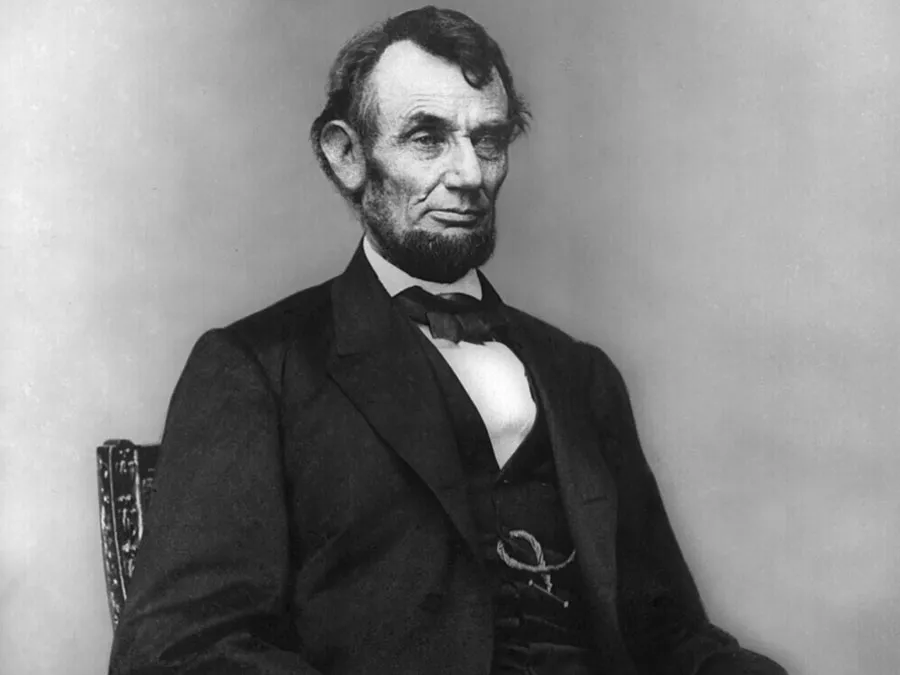Abraham Lincoln Biography: Abraham Lincoln was an American lawyer, politician, and statesman who was the 16th President of the United States from 1861 to 1865.
Abraham Lincoln Biography
Abraham Lincoln Biography: Abraham Lincoln was born on February 12, 1809, in a log cabin on Sinking Spring Farm near Hodgenville, Kentucky, to Thomas Lincoln and Nancy Hanks Lincoln. He was a descendant of Samuel Lincoln, an Englishman who moved to Hingham, Massachusetts, from Hingham, Norfolk, in 1638. The family then traveled west, stopping in New Jersey, Pennsylvania, and Virginia.
Lincoln was also descended from the Virginia Harrison family; his paternal grandfather and namesake, Captain Abraham Lincoln, and his wife Bathsheba (née Herring) relocated the family from Virginia to Jefferson County, Kentucky. In 1786, the captain was murdered during an Indian attack. Abraham’s children, including eight-year-old Thomas, witnessed the incident. After there, Thomas did various jobs in Kentucky and Tennessee before settling in Hardin County, Kentucky, in the early 1800s.
Abraham Lincoln Wiki
Abraham Lincoln Biography: Lincoln was born in a wilderness hut 3 miles south of Hodgenville, Kentucky, and was transported to a farm in the nearby Knob Creek valley when he was two years old. His first recollections were of this house, including a flash flood that washed away the maize and pumpkin seeds he had helped his father sow.
| Birthday | 12 February 1809 |
| Birth Place | 2995 Lincoln Farm Rd. off of U.S. 31E, near Louisville, KY |
| Height | 1.93m |
| Weight | 82kg |
| Zodiac Sign | Aquarius |
| Date of death | 15 April 1865 |
| Cause of Death | President Lincoln was shot while attending a play at Ford’s Theatre |

Abraham Lincoln Education
Lincoln primarily schooled himself. Itinerant instructors provided his official education. It includes two brief spells in Kentucky, where he learned to read but presumably not to write, at seven, and in Indiana, where he attended school infrequently owing to agricultural duties for fewer than 12 months by age fifteen.
He was an ardent reader who had a lifetime interest in learning. According to family, neighbors, and schoolmates, his reading list includes the King James Bible, Aesop’s Fables, John Bunyan’s The Pilgrim’s Progress, Daniel Defoe’s Robinson Crusoe, and Benjamin Franklin’s Autobiography.
Read Also: Swami Vivekananda Biography, Wiki, Early Life, Education, Legacy and Death
Early Political Career of Abraham Lincoln
Andrew Jackson was president when Lincoln initially entered politics. Lincoln shared the Jacksonians’ sympathy for the ordinary person but disagreed with their belief that the government should be separated from commercial business. “The legitimate object of government,” he subsequently said, “is to do for a community of people whatever they need to be done but cannot do at all, or not so well, for themselves, in their separate and individual capacities.”
Among notable politicians of the day, he respected Henry Clay and Daniel Webster the most. Clay and Webster supported employing federal government powers to foster industry and develop the country’s resources through a national bank, a protective tariff, and an internal transportation development program. Lincoln believed such economic development assistance was sorely required in Illinois and the West. Initially, he was a Clay and Webster’s Whig party member.
Lincoln committed himself as a Whig member of the Illinois State Legislature, to which he was elected four times from 1834 to 1840, to a grandiose scheme of establishing a network of railways, roadways, and canals with state funding. Whigs and Democrats worked together to enact an omnibus measure funding these projects, but the 1837 panic and subsequent business collapse forced the cancellation of most of them. During his time in the legislature, he established that, while he was opposed to slavery, he was not an abolitionist.
In reaction to the mob murder of antislavery newspaperman Elijah Lovejoy in Alton in 1837, the legislature issued resolutions criticizing abolitionist groups and upholding slavery in the Southern states as “sacred” under the federal Constitution. Lincoln voted against the resolutions. He drafted a complaint with a colleague who said, on the one hand, that slavery was “founded on both injustice and bad policy” and, on the other, that “the promulgation of abolition doctrines tends rather to increase than to abate its evils.”

As the lone Whig from Illinois, Lincoln paid little attention to legislative affairs during his one tenure in Congress (1847-49). He proposed a bill for the gradual and compensated emancipation of enslaved people in the District of Columbia. Still, because it was to be implemented only with the approval of the district’s “free white citizens,” it displeased both abolitionists and slaveholders and was never seriously considered.
Lincoln spent a significant portion of his time in presidential politics, unmaking one president, a Democrat, and establishing another, a Whig. In the Mexican War, he discovered a problem and a candidate. With his “spot resolutions,” he questioned President James K. Polk’s claim that Mexico initiated the war by spilling American blood on American territory. Lincoln and other party members voted to criticize Polk and the war while still voting for supplies to keep it going. Simultaneously, he worked for the candidacy and election of battle hero Zachary Taylor.
Lincoln anticipated being nominated commissioner of the general land office as a return for his campaign efforts after Taylor’s election victory, and he was severely upset when he did not win the post. Meanwhile, his views of the war had yet to go over well with constituents in his congressional district. At the end of his public career at 40, he appeared to be dissatisfied with politics.





















